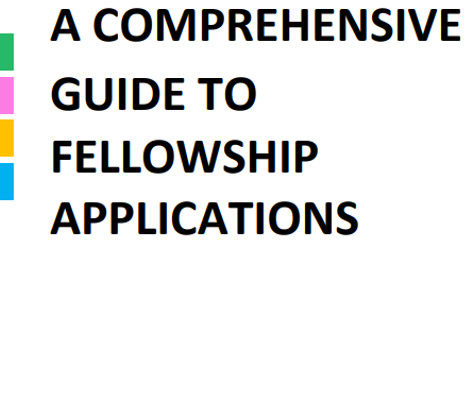In this blog post Dr Anna Pilz, Academic Developer & Trainer at the IAD, discusses the benefits of writing fellowship applications and how her new fellowship application guide could support the process.
Anyone who has made it to this blog won’t need to be told what the benefits of Fellowships are. How often, however, does an applying fellow reflect on the value of the process of writing said application?
1. It enables you to reflect on your career goals.
Fellowship are given to people. A key aspect of an application is therefore to highlight the expertise and skills you bring to the proposed project as well as how the project will enable you to develop as a researcher. To give a compelling narrative in your application, you have to take stock of your research profile at the time of application in conversations with colleagues, mentors and friends; think about and articulate your career ambitions; and develop your research project in tandem with your own professional development.
2. It is active research time as you develop your research project.
The need to articulate research objectives, establish the timeliness of your research ideas in the wider context, establish the project’s contribution to research fields, think about a publication plan for your findings and ways to engage with non-academic audiences etc means that you’re actively shaping your next project. Reading done for the state-of-the-art section or literature review part of an application is equally preparatory work for conference papers or publications and could strategically be used to write up a review paper of a research field further enabling you to build your research profile in that area. Outlining your work programme for the project means that you have a clear path as to what would be the next steps and means that you can identify project activities that you could apply for other funding for (for instance, archive-based fellowships to access resources or workshop grants to bring together project stakeholders) in order to build your grant-capture profile.
3. It enables you to actively build your network.
In the process of writing your fellowship application you have to identify and reach out to a host department and, for some schemes, a mentor. Depending on the project, you may reach out to colleagues who could form an advisory board for your project or who will be collaborators. You may find yourself reaching out to NGOs or industry stakeholders who would be interested in your project findings. Regardless of the outcome of your application, these contacts may lead to invitations to seminars, publications, or future collaborations.
It’s admittedly hard to see the benefits of writing a fellowship application when the outcome might determine whether or not you’ll have a job at the end of a current fixed-term contract, whether you’ll be able to stay in a place or finally move to a location to reunite with a partner and/or family. Yes, fellowship applications are time-consuming; they take a lot of emotional energy to envision yourself in a place, carefully developing and designing a project with a publication and impact plan along with multiple supporting documents; they follow a formulaic structure with text boxes or word limits, jargon and requests for details that seem like you’re supposed to have done the project already. To rage about these things, however, is energy better invested otherwise. At the point at which you’re in the midst of an application, you have no control over external factors. But you can control the narrative of your application. That is a creative process. “A Comprehensive Guide to Fellowship Applications” is designed to help you in that process.
Lean into it. Every fellowship application is an opportunity to reflect on career goals, to develop time and project management skills, and to shape your research projects and research strategy. The labour that goes into fellowship applications is active research time.


